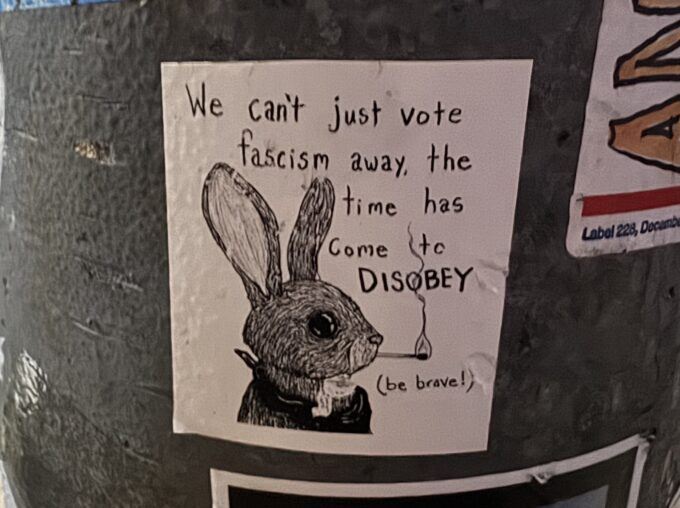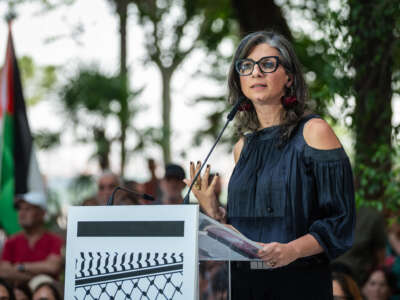You Must Refuse Illegal Orders, If This be Treason, Make the Most of It

Photograph by Nathaniel St. Clair
“You can refuse illegal orders … you MUST refuse illegal orders.”
That’s the message from a recent video featuring six Democratic members of Congress, all former members of the US armed forces and/or intelligence services, and directed at current members of those organizations.
Seems non-controversial, but someone else would like a word. Er, several words:
“Their words cannot be allowed to stand. SEDITIOUS BEHAVIOR FROM TRAITORS!!! LOCK THEM UP??? … SEDITIOUS BEHAVIOR, punishable by DEATH!”
As you’ve probably guessed, that someone else is US president Donald Trump.
And he’s not just talking. He’s had US secretary of defense Pete Hegseth threaten to recall one of the politicians in question, US Senator Mark Kelly, to active duty in the Navy for a potential court-martial. He’s having the Federal Bureau of Investigation request “interviews” with with all six politicians.
Yes, really.
But, like I said, the whole thing seems uncontroversial. This is, to use a turn of phrase Trump seems to like, a “witch hunt.”
It’s been 40 years since I spent the summer in San Diego becoming a US Marine. I’m sure things have changed since then, but I doubt they’ve changed so much that anyone graduates any armed forces boot camp without receiving instruction in the Uniform Code of Military Justice.
A summary, from memory, on the section (article 92) concerning orders:
You must obey lawful orders.
You must not obey unlawful orders.
As I recall it, the case my platoon’s instructor used as an example was Lt. William Calley’s conduct in Vietnam during an event later known as the “My Lai Massacre.”
Here’s what the US Court of Military Appeals had to say about Calley’s defense that he was “just following orders”:
“An order requiring the performance of a military duty may be inferred to be legal. An act performed manifestly beyond the scope of authority, or pursuant to an order that a man of ordinary sense and understanding would know to be illegal, or in a wanton manner in the discharge of a lawful duty, is not excusable.”
Calley served three years (of a life sentence) for the murders at My Lai.
Why? Because you must refuse illegal orders.
If it’s “treason” or “sedition” to state that fact, then every instructor in every basic training class on military law is a traitor who’s been teaching treason and preaching sedition to every recruit since 1950, when the UCMJ was adopted … and probably long before that.
Would these particular politicians have made this particular video if it was a Democrat issuing illegal orders from the White House?
Probably not, but they’re right anyway.
Note to military and intelligence personnel:
You must refuse illegal orders.
If this be treason, make the most of it.
The courageous action of six Democratic members of Congress has thrust into the national discourse the duty of military and CIA personnel to disobey Donald Trump’s illegal orders. As the Trump administration continues to unlawfully murder people in small vessels in the Caribbean and Eastern Pacific, deploy the National Guard to U.S. cities, and ignore court orders, the six lawmakers were moved to act.
In a 90-second video organized by Sen. Elissa Slotkin (Michigan), two senators and four Congress members, all U.S. military or CIA veterans, take turns reading a statement to active servicemembers, urging them to refuse to follow illegal orders.
“Like us, you all swore an oath to protect and defend this Constitution,” the lawmakers said in the video. “Right now, the threats to our Constitution aren’t just coming from abroad, but from right here at home. Our laws are clear. You can refuse illegal orders. You can refuse illegal orders. You must refuse illegal orders. No one has to carry out orders that violate the law or our Constitution.”
The other lawmakers speaking in the video are Sen. Mark Kelly (Arizona) and Representatives Chris Deluzio (Pennsylvania), Maggie Goodlander (New Hampshire), Chrissy Houlahan (Pennsylvania), and Jason Crow (Colorado).
Trump Threatens Six Lawmakers With Sedition Charges and Hanging
Their words, which constituted a correct statement of the law, elicited unprecedented vitriol from Trump, who wrote on Truth Social: “It’s called SEDITIOUS BEHAVIOR AT THE HIGHEST LEVEL. Each one of these traitors to our Country should be ARRESTED AND PUT ON TRIAL.”
“Right now, the threats to our Constitution aren’t just coming from abroad, but from right here at home … You must refuse illegal orders. No one has to carry out orders that violate the law or our Constitution.”
In a second post, Trump wrote: “This is really bad, and Dangerous to our Country. Their words cannot be allowed to stand. SEDITIOUS BEHAVIOR FROM TRAITORS!!! LOCK THEM UP??? President DJT.” And he added in a third post: “SEDITIOUS BEHAVIOR, punishable by DEATH!” Trump also reposted a statement saying: “HANG THEM GEORGE WASHINGTON WOULD !!”
The six lawmakers responded to Trump’s diatribe in a statement: “What’s most telling is that the president considers it punishable by death for us to restate the law. Our servicemembers should know that we have their backs as they fulfill their oath to the Constitution and obligation to follow only lawful orders. It is not only the right thing to do, but also our duty.”
Now the Department of War is investigating Kelly for “serious allegations of misconduct,” threatening to call him back to active duty and court-martial him. The Department’s “Official Statement” posted on X adds, “All servicemembers are reminded that they have a legal obligation under the UCMJ to obey lawful orders and that orders are presumed to be lawful.” But they fail to add that servicemembers also have a legal duty to disobey unlawful orders, which is what Kelly and his fellow lawmakers accurately stated in their video.
The Duty to Disobey Unlawful Orders
Under the Uniform Code of Military Justice (UCMJ), a servicemember can be punished by court-martial for refusing to obey any lawful order or regulation. Although the UCMJ doesn’t define “lawful,” the Manual for Courts-Martial states that an order is lawful “unless it is contrary to the Constitution, the laws of the United States, or lawful superior orders or for some other reason is beyond the authority of the official issuing it.”
The manual also says that although it may be inferred that an order to perform a military duty or act is lawful, “this inference does not apply to a patently illegal order, such as one that directs the commission of a crime.” The Rules for Courts-Martial say that acting “pursuant to orders” is a legitimate defense “unless the accused knew the orders to be unlawful or a person of ordinary sense and understanding would have known the orders to be unlawful.”
Finally, the manual notes, “The lawfulness of an order is a question of law to be determined by the military judge.” Normally, that determination can be made only after a servicemember refuses or disobeys an order, in a court martial or war crimes tribunal. So the refuser takes the risk that a judge will find the order lawful and he or she will be punished for refusing to follow it.
Examples of unlawful orders within the United States include:
- The use of military forces to deport, remove, or detain immigrants. Removal to countries where there is a substantial likelihood of torture violates the Convention Against Torture and Other Cruel, Inhuman or Degrading Treatment or Punishment, which the U.S. has ratified.
- The use of military forces against civilian protesters. The Posse Comitatus Act forbids the use of federal troops to enforce domestic law unless there is an “insurrection.”
Examples of unlawful orders outside the United States include:
- Military attacks on vessels in international or foreign waters.
- An invasion or attack on Venezuela, Mexico, Nigeria, etc.
- The use of “preemptive” military force against Iran, China, etc.
- The use of nuclear weapons against any country.
- The torture or cruel treatment of civilians, prisoners of war, or other detainees.
- The intentional targeting of civilians.
- Attacking Palestinians in Gaza under the guise of “peacekeeping.”
Resistance to Illegal U.S. Wars — From Vietnam to Iraq
In 1968, U.S. Army Lt. William Calley led 100 U.S. troops into the village of My Lai in Vietnam and killed 500 civilian women, children, and elderly men in what came to be known as the My Lai Massacre.
“Servicemembers should know that we have their backs as they fulfill their oath to the Constitution and obligation to follow only lawful orders.”
Calley was accused of the premeditated murder of civilians. Charges were filed against 25 people, including two generals. The charges against the generals, 10 other officers, and seven enlisted men were dismissed. Five others, including the company commander, Capt. Ernest Medina, were court-martialed and acquitted.
At his court-martial, Calley claimed that he was just following Medina’s orders to kill all the villagers because everyone in the village was “the enemy.”
Like the Nazi officials at Nuremberg, Calley’s defense that he was just following superior orders was rejected. In 1971, he was convicted of the premeditated murder of “not less than” 22 Vietnamese people and sentenced to life in prison. Ultimately, Calley only served over three years of house arrest and confinement to barracks.
But there is a noble tradition in the United States of servicemembers refusing orders to deploy to illegal wars and/or commit war crimes. Some refusers have been arrested and court-martialed. Many have argued in their defense that they had a legal duty to disobey illegal orders.
Howard Levy
In 1965, Dr. Howard Levy was a captain in the Army and chief of Dermatological Service of the U.S. Army Hospital at Ft. Jackson in South Carolina. Levy thought that Black soldiers were being used as cannon fodder for the illegal Vietnam War.
Levy disobeyed an order to train Special Forces aidmen to be paramedics. He felt they would use their medical training to gain the trust of the Vietnamese people who would then not oppose U.S. troops carrying out their illegal missions. Levy, who called this the “prostitution of medicine,” thought these Green Berets were committing war crimes.
In 1967, Levy was charged by court-martial with willfully disobeying a lawful command by his superior officer, conduct unbecoming an officer and a gentleman, and publicly uttering statements to enlisted personnel with design to promote disloyalty and disaffection among the troops.
Levy tried to argue that the war was illegal and immoral and that U.S. troops were committing war crimes. But the judge didn’t allow him to raise that defense, and Levy was convicted of all charges and sentenced to dismissal from the Army, forfeiture of all pay and allowances, and three years confinement at hard labor.
Ehren Watada
Resistance to George W. Bush’s illegal Afghanistan and Iraq Wars was also widespread. Many resisters were inspired by their predecessors who had resisted the Vietnam War.
When U.S. Army First Lieutenant Ehren Watada, the first commissioned officer to publicly disobey an order to deploy to Iraq, addressed the 2007 Veterans For Peace convention, he invoked the GI Movement that helped end the Vietnam War. He said:
I speak with you about a radical idea. It is one born from the very concept of the American soldier (or service member). It became instrumental in ending the Vietnam War — but it has been long since forgotten. The idea is this: that to stop an illegal and unjust war, the soldiers can choose to stop fighting it.
In 2006, the Army had charged Watada with missing movement and conduct unbecoming an officer and a gentleman. He stated at a press conference in Tacoma, Washington: “The war in Iraq is in fact illegal. It is my obligation and my duty to refuse any orders to participate in this war. An order to take part in an illegal war is unlawful in itself. So my obligation is not to follow the order to go to Iraq.” Citing “deception and manipulation and willful misconduct by the highest levels of my chain of command,” he declared that there is “no greater betrayal to the American people” than the Iraq War.
The “turning point” for Watada was when he “saw the pain and suffering of so many soldiers and their families, and innocent Iraqis.” He stated, “I best serve my soldiers by speaking out against unlawful orders of the highest levels of my chain of command, and making sure our leaders are held accountable.” Watada felt he “had the obligation to step up and do whatever it takes,” even if that meant facing court-martial and imprisonment.
At Watada’s court-martial, the military judge refused to allow me to testify as an expert on the illegality of the Iraq War and the war crimes the Bush administration was committing there. I would have testified about the Nuremberg Charter, United Nations Charter, Geneva Conventions, Uniform Code of Military Justice, and Army Field Manual.
The judge eventually declared a mistrial. Although the government sought a second court-martial in which Watada would face six years in custody and a dishonorable discharge, the judge said double jeopardy had attached. Watada was allowed to resign from the Army and was discharged under less-than-honorable conditions.
“Lt. Watada’s heroism arose in his conclusion that the invasion of Iraq was unlawful, that his participation in that unlawful invasion would abet an unlawful war of aggression, and that he would be willing to accept the consequences of his refusal to participate, despite great personal sacrifices, including nearly-total alienation from his comrades-in-arms, the potential for a lengthy prison term, and the hatred and scorn heaped upon him by untold numbers of misguided citizens,” Kenneth Kagan, one of Watada’s lawyers, told Kathleen Gilberd and me for our 2009 book,Rules of Disengagement: The Politics and Honor of Military Dissent. “I have been deeply moved by his courage and steadfastness throughout.”
Pablo Paredes
I was allowed to testify as an expert at the 2005 court-martial of U.S. Navy Petty Officer Third Class Pablo Paredes, who refused orders to board an amphibious assault ship that would transport 3,000 Marines to Iraq because he thought he would be complicit as a war criminal.
The Navy charged Paredes with unauthorized absence and missing his ship’s movement by design. The military judge convicted Paredes of missing movement by design but dismissed the unauthorized absence charge.
Before sentencing, Paredes told the judge, “I am guilty of believing this war is illegal. I am guilty of believing war in all forms is immoral and useless, and I am guilty of believing that as a service member I have a duty to refuse to participate in this War because it is illegal.” He added, “I believe as a member of the armed forces, beyond having a duty to my chain of command and my President, I have a higher duty to my conscience and to participate in any way, hands-on or indirect, in the current aggression that has been unleashed on Iraq.”
Although the judge refused to allow my expert testimony on the illegality of the Iraq War in the guilt phase, he did allow me to testify at the sentencing hearing.
I testified that the Iraq War violated the UN Charter, and that Paredes had a reasonable belief that by transporting Marines to Iraq, he would place them in the position of committing war crimes. I explained how U.S. forces were torturing prisoners at Abu Ghraib prison, which constituted war crimes.
Then I said that both the Nuremberg Principles and the Uniform Code of Military Justice established a duty to obey lawful orders but also a duty to disobey unlawful orders.
“It’s not just the commission of war crimes, or crimes against the peace, or crimes against humanity that is punishable, but also complicity in the commission of those crimes,” I testified. Thus, if a person was “transporting someone over to Iraq to commit war crimes, they would be liable for the war crimes just the same as the person who actually committed the war crimes.”
I concluded that orders to board the ship and transport Marines to fight in an illegal war and potentially commit war crimes were unlawful. Paredes therefore had a duty to refuse those unlawful orders to embark on the ship in December 2004.
Reacting to the inept cross-examination of me by the Navy prosecutor, who bolstered my testimony, the judge ironically stated, “I think that the government has successfully proved that any service member has reasonable cause to believe that the wars in Yugoslavia, Afghanistan and Iraq were illegal.”
Although the government sought nine months in the brig, forfeiture of pay and allowances, and a bad conduct discharge, the judge sentenced Paredes to no jail time and refused to order a bad conduct discharge. He gave Paredes two months restriction to the base, three months of hard labor without confinement, and a reduction in rank to seaman recruit.
“From the Vietnam War to the present, dissident soldiers have spoken out in opposition to illegitimate wars and in doing so have expanded soldiers’ right to dissent,” Gilberd and I wrote in our Rules of Disengagement book. “Their legal challenges and political efforts have broadened the rights of other servicemembers opposed to a war or oppressive military policies.”
After the six members of Congress released their bold video, Veterans For Peace said in a statement:
We call on all veterans to stand with these members of Congress and amplify their message so that Airmen, Marines, Seamen, and Army troops know that if they ever face the difficult challenge of refusing an illegal order, they are carrying out their oath to defend the Constitution by following the law.



